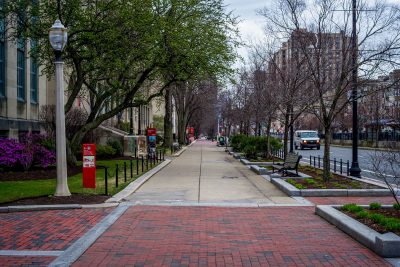
Amid the coronavirus outbreak, in-person orientation for Boston University’s class of 2024 has been canceled and the university’s introductory program will be taking place online. The students hired to coordinate orientation for the incoming class have been forced to make changes and adapt to a remote orientation program.
Student Facilitators, Wellbeing Project Champions and Common Ground facilitators have all received emails from their corresponding orientation directors announcing that orientation will be online. Possible platforms where this will take place have not yet been announced.
The orientation office offers 11 different student positions, ranging from coordinators, facilitators, ambassadors, assistants and managers to major BU programs and departments, such as Student Health Services, Howard Thurman Center and Innovate@BU.
Cassidy Velasquez, a freshman Common Ground facilitator in the College of Arts and Sciences, said the communication with student leaders has been good, despite the current shortage of information.
“It kind of surprised me how they did a pretty good job even though they didn’t really have a lot of information to give us,” Velasquez said. “I feel like they’ve done the best they can.”
Zoe Plzak, a freshman Student Facilitator in CAS, said that information is being sent out as soon as new decisions are made and the directors are being flexible with student facilitators.
“Every time they make a new decision, we get more information,” Plzak said. “It’s hard to make choices and make decisions when you don’t know what’s going to happen in the future, so they’ve been doing their best to keep things flexible.”
Sophia Delia, a freshman Wellbeing Project Champion in the College of Engineering, said that the communication has been nice and the directors have been very understanding under the new circumstances.
“They have been very communicative, which is really nice,” Delia said. “They’ve been really understanding now about us needing to be flexible with our schedules.”
The reduction in perks, specifically free summer housing for orientation leaders, has caused some facilitators to leave the orientation program. Contact with incoming students for student facilitators has also been shifted to a website with pre-formed questions and answers, according to Maggie Farr, a freshman student facilitator in CAS.
Baiden Wright, a freshman in CAS and former student facilitator who resigned her position, said that in her case, being a facilitator wasn’t worth it after the housing guarantee was eliminated.
“I have a job here where I get compensated way more for than I would just with the rates they’d be paying,” Wright said. “It just didn’t make sense for me to do it without housing.”
Velasquez also said she had considered quitting, but for her it was motivated by concerns about being able to access the online platform.
“I personally don’t have stable access to the Internet back home so I was kinda like ‘I might not be able to do this,’” Velasquez said.
Velasquez also said she was feeling disappointed about not being able to experience the orientation facilitator program on-campus.
“It’s been really disappointing to see the way things are sort of falling apart,” Velasquez said. “I was really looking forward to that opportunity to just sort of be away from home for summer.”
Farr said that she also considered quitting but ultimately decided to stay with the hopes to give the incoming freshmen the best possible experience.
“Even though I know that orientation isn’t going to be the same for [the class of 2024], like as good as in person,” Farr said, “I think that I’m going to try my best to give them the amazing experience that I had.”
A worry expressed by facilitators has also risen regarding the newly online aspect of communication between incoming students and facilitators.
Farr raised concerns about answering questions honestly on a new questions and answers website.
“All of the stuff that you’re putting on [it] has to be screened by the orientation director,” Farr said. “So that definitely changes how I’m phrasing some stuff.”
Delia also brought up the monitoring and hopes that orientation staff won’t interfere with her connections to incoming students.
“I hope the university, because it has the power to monitor our conversations with students so closely, doesn’t interfere with any organic aspects or relationships,” Delia said. “Part of what made orientation leaders so good was because they just talked to you like people.”
Plzak also talked about one of the most important parts of orientation being the personal discussions.
“I think one of the important parts of orientation when it was in-person was allowing people to have discussions that weren’t just receiving information about the school but talking about themselves,” Plzak said. “If we were able to do live sessions with the students, keeping that would be important.”














